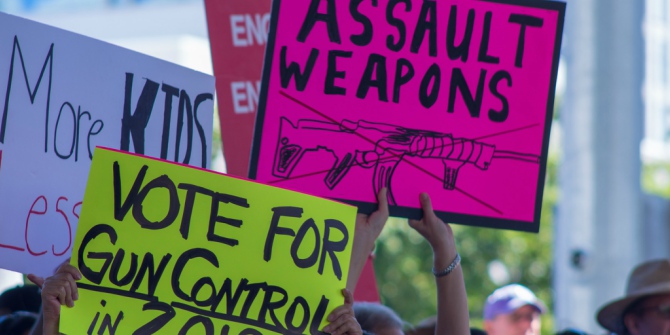 While there is considerable social science research demonstrating that minorities such as African, Latino, and Hispanic Americans are less likely to express trust and confidence in police than whites, there is far less evidence concerning community confidence in police oversight. Using a large community survey from a Western city as a case study, Joseph De Angelis argues that such surveys can help local policy makers to proactively identify community concerns about policing before high profile events – such as police shootings – occur, and to help build a case for organizational reform.
While there is considerable social science research demonstrating that minorities such as African, Latino, and Hispanic Americans are less likely to express trust and confidence in police than whites, there is far less evidence concerning community confidence in police oversight. Using a large community survey from a Western city as a case study, Joseph De Angelis argues that such surveys can help local policy makers to proactively identify community concerns about policing before high profile events – such as police shootings – occur, and to help build a case for organizational reform.
A great deal of academic scholarship has explored community attitudes toward local police over the last thirty years. For example, we know that people are more likely to cooperate with law enforcement when they trust the police. Moreover, a large body of social science research has demonstrated that how individuals perceive the police can vary depending on their race and ethnicity. While Americans, in general, tend to hold fairly positive attitudes toward local law enforcement, African Americans and Latino/Hispanic Americans consistently report lower levels of trust and confidence in the police than White residents.
During the same period that academics have been focusing on attitudes toward the police, the US has seen a rapid rise in the number and kinds of accountability mechanisms designed to increase community confidence in law enforcement agencies. For example, almost all large jurisdictions in the US have implemented some form of police oversight, such as civilian review boards, police auditors, or police monitors. Many of these agencies were created following high profile critical incidents involving residents from communities of color (e.g., officer-involved shootings or incidents of biased policing) and most were implemented with the explicit goal of improving the public’s trust and confidence in the police. Yet, very little academic research has explored public attitudes toward police accountability initiatives or whether those attitudes vary by race or ethnicity. More critically, very few jurisdictions in the US have used systematic surveys to examine how residents perceive municipal efforts to control the conduct of local police officers.
Recently, one large city in the western United States conducted a series of community surveys, with nearly 4,000 responses, with the goal of exploring how community members evaluated the effectiveness of the municipality’s police accountability efforts. One of the important findings from the research was that public attitudes toward to the control of police officer conduct shifted over time. A majority of the community members who responded to the survey were satisfied with the city’s handling of officer conduct for the first three years, but levels of overall satisfaction began to decline precipitously in the final two years of the study period.
Figure 1 – Percentage of Survey Respondents Reporting they Agree/Strongly Agree that: “The City government does a good job of handling officer conduct.”

A second important finding was that there was noticeable variation across different demographic groups in relation to attitudes toward the city’s efforts to control the conduct of its police officers. African Americans and Latino/Hispanic respondents were generally less likely to indicate that they were satisfied with the city’s police accountability efforts than Whites, even after statistical controls were introduced for the other factors that might have influenced public opinion, such as gender, fear of crime, the characteristics of the person’s neighborhood, and broader satisfaction with the government. Interestingly, while patterns in reported satisfaction were similar for African Americans and Latinos between 2006 and 2008, African American satisfaction declined noticeably in 2010 and 2011, while Latino/Hispanic satisfaction remained fairly stable.
In considering these results, it’s important to ask why it might be valuable for cities to know that community attitudes toward police accountability efforts vary across time and among racial/ethnic groups. Could we not guess this from watching the nightly news? First, routinely administering community-levels surveys has the potential to help local policy makers engage in early, proactive identification of community concerns. In general, many jurisdictions implement new police accountability measures only after public controversy erupts following high profile critical incidents, such as shootings, in-custody deaths, or allegations of racial profiling. Yet, well-designed community-level surveys may help local policy makers, police administrators, and police oversight agencies to proactively identify broad patterns in community concern with police officer conduct. Moreover, this type of “hard data” can then be used to build a case for organizational reform. For example, satisfaction with police accountability efforts in this city began to decline shortly after that jurisdiction’s police oversight agency published a series of reports that were extremely critical of the light discipline imposed on officers involved in alleged excessive force. The oversight agency’s criticism, along with video of the alleged misconduct, catalyzed several months of intense media coverage. The survey data, which was collected both before and after the public controversy, highlighted the type of damage that can be done to public confidence when cities fail to responded to perceived officer misconduct in an effective manner.
Second, community-level surveys may also help local jurisdictions spot groups of individuals who may be more skeptical of the city’s police accountability initiatives. Does the community trust that the city is doing everything it can to ensure that police officers are performing their work in an ethical and respectful manner? Does that trust vary by social group or neighborhood? By using community-level surveys to identify trust deficits in the community, cities may be able to craft more effective outreach and/or policy changes that may help resolve some of the underlying conditions that have fueled the development of that distrust.
This article is based on the paper, ‘What Do Citizens Think About Police Accountability Measures? Lessons From Community Attitudinal Surveys’, forthcoming in Criminal Justice Policy Review.
Featured image credit: jog (Flickr, CC-BY-NC-SA-2.0)
Please read our comments policy before commenting.
Note: This article gives the views of the author, and not the position of USAPP – American Politics and Policy, nor the London School of Economics.
Shortened URL for this post: http://bit.ly/1jYOiEi
_________________________________
 Joseph De Angelis – University of Idaho
Joseph De Angelis – University of Idaho
Joseph De Angelis is an assistant professor in the Department of Sociology & Anthropology at the University of Idaho. He has also served as a policy director and an analyst for two police oversight agencies in the U.S. His research has appeared in a variety of scholarly journals, including the Journal of Criminal Justice, Criminal Justice Review, Police Quarterly, Criminal Justice Policy Review, and Policing: An International Journal of Police Strategies and Management.






